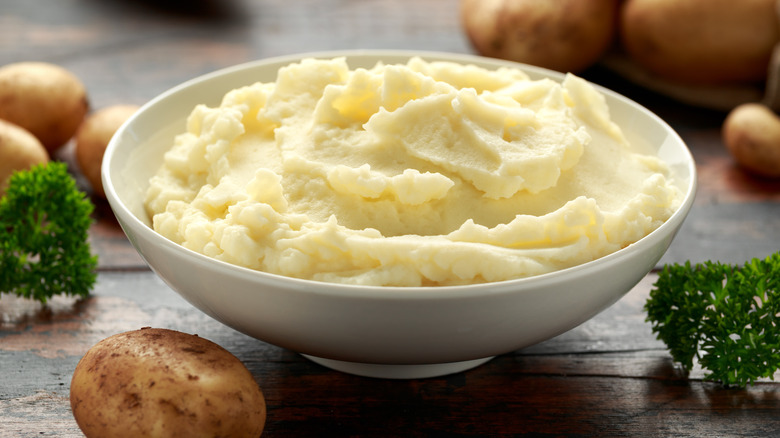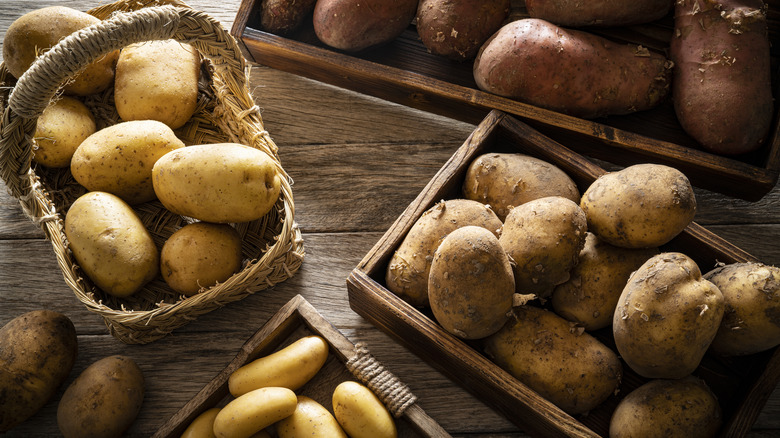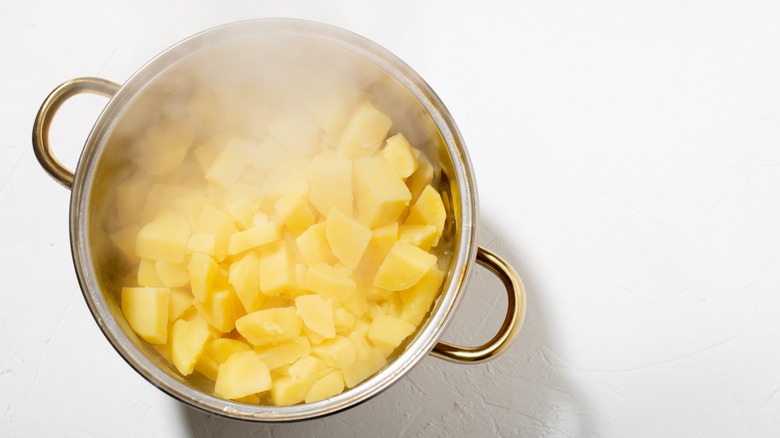Why Starch Is Crucial For High-Quality Mashed Potatoes
You can't have a proper Thanksgiving dinner without a side of mashed potatoes. Whether you like them smooth or lumpy, with or without skin, they're immensely popular, versatile, and easy to prepare. But don't let the simple nature of this dish lead you into thinking it's foolproof; you've got to get all of the details right, particularly the levels of moisture and starch.
Potatoes are primarily composed of water and starch, and the balance of these two elements is critical. The starch is an important source of energy for the plant, but it is equally useful to us in the kitchen. Potato starch is an effective thickening agent, much like cornstarch, but it thickens up quicker, and at lower temperatures than cornstarch, which makes things smoother and creamier. Water, on the other hand, makes a mixture loose, which is why thick, creamy mashed potatoes require you to use potatoes with high levels of starch and low levels of moisture.
Starchy potatoes vs. waxy potatoes
There are over 4,000 varieties of potatoes, but they can generally be lumped into two groups: starchy and waxy. Starchy potatoes have a pretty self-explanatory name, their key trait being their high starch content. They are also low in moisture, and they work well in mashed potatoes for a few reasons. Firstly, starchy potatoes have a very soft and fluffy texture when cooked, which makes mashing them quite easy. Their low moisture content also means that they readily absorb cream, milk, and butter.
Waxy potatoes are on the other end of the spectrum, having less starch and a higher moisture level. They are slightly sweet, and more flavorful than starchy potatoes, which tend to be quite bland on their own. Waxy potatoes also have a firmer texture than starchy potatoes, and they hold their shape well even after you boil them. This makes them difficult to mash.
The best (and worst) potatoes for mashing
The two most popular choices for mashed potatoes are Russets and Yukon Golds. Russet potato varieties are some of the most popular, and they are a classic for a reason. Their especially high starch content makes them perfect for mashing, but they offer almost nothing in the way of flavor, so some added fat in the form of butter and cream is essential. For a slightly more flavorful option, try Yukon Gold potatoes. They are a bit less starchy than Russets and are sometimes referred to as all-purpose potatoes, falling between the starchy and waxy ends of the spectrum.
Using waxy potatoes will give you a mash that is dense and lumpy, so they're a no-go for this particular purpose. However, waxy potatoes are excellent choices for soups and stews, and the ideal base for potato salad. Common varieties of waxy potatoes include red potatoes, fingerlings, and new potatoes.
You can also experiment with combining multiple varieties of potato. A one-to-one ratio of Russets to Yukon Gold potatoes is all but guaranteed to yield a great plate of mash, but you could even experiment with adding small amounts of other, waxier varieties to play with the texture and flavor.


